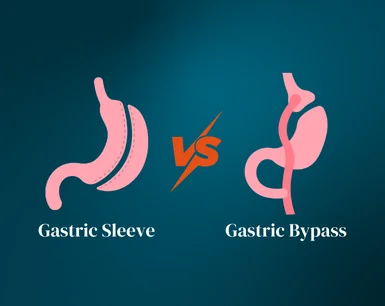Considering weight-loss surgery is a major decision, and understanding your options is the first step. At Phoenix Health, we specialise in bariatric procedures that help people achieve long-term weight loss and improved health. Two of the most common weight-loss surgeries in the UK are the gastric sleeve and the gastric bypass.
Although both aim to reduce food intake and support weight loss, the difference between gastric bypass and sleeve lies in how the procedures are carried out, their effects on the digestive system, and the lifestyle changes required afterwards.
Gastric Sleeve
In a gastric sleeve (sleeve gastrectomy), around 70 to 80% of the stomach is removed, leaving a narrow, tube-shaped pouch. The smaller stomach restricts the amount of food a person can eat and also reduces the production of ghrelin, the hormone responsible for hunger.
Because the digestive tract remains intact, food digestion continues in the usual way. The procedure is irreversible but less complex than bypass surgery, making it a popular choice among Phoenix Health patients who want effective weight loss without major changes to digestion.
One recognised drawback of the gastric sleeve is that some patients may develop long-term acid reflux. Vitamin and mineral deficiencies can also occur, so lifelong supplementation is required, though these are usually less severe compared with gastric bypass.
Gastric Bypass
The gastric bypass (Roux-en-Y) is a more complex operation. A small stomach pouch is created and connected directly to the small intestine, bypassing most of the stomach and part of the gut. This means food intake is limited and fewer calories and nutrients are absorbed.
The procedure also alters gut hormones, which can help reduce appetite and improve blood sugar control. Gastric bypass requires careful lifelong nutritional monitoring, but at Phoenix Health it is often recommended for patients with type 2 diabetes, more severe obesity, or those seeking more durable long-term weight loss.
Weight Loss and Health Outcomes: Gastric Sleeve vs Gastric Bypass
When comparing the difference between gastric bypass and sleeve, both achieve impressive results. Patients with a gastric sleeve typically lose 50–60% of their excess weight within one to two years. With gastric bypass, the figure is usually higher, around 60–80%, and weight tends to come off more quickly. Bypass results are also often more durable in the long term.
Both surgeries also bring major health benefits. They can improve or resolve conditions such as type 2 diabetes, high blood pressure, sleep apnoea, and joint pain. The gastric sleeve supports better blood sugar control, while the gastric bypass is particularly effective for diabetes remission and lowering cholesterol. Check out our patients’ gastric sleeve before and after photos and gastric bypass before and after photos here.
Risks and Long-Term Considerations: Gastric Sleeve vs Gastric Bypass
Both surgeries carry risks. For the gastric sleeve, possible complications include leakage along the staple line, long-term acid reflux, and vitamin deficiencies. Gastric bypass carries a higher risk of complications due to its complexity, and patients may experience dumping syndrome as well as more significant vitamin and mineral deficiencies if supplements are not taken.
Lifestyle changes are essential after both operations. A healthy diet, portion control, regular exercise, and vitamin supplementation are key to long-term success. Many patients adapt more easily after a sleeve because digestion remains normal, while gastric bypass patients need to be more vigilant with diet and supplements. Our comprehensive aftercare programme ensures full support for patients following either surgery.
Choosing the Right Option
The best choice depends on each patient’s health, goals, and commitment to long-term changes. The gastric sleeve is often chosen for its simplicity and strong weight-loss outcomes, while the gastric bypass is recommended for those with severe obesity or poorly controlled diabetes.
At Phoenix Health, our team of bariatric consultants with over 20 years’ experience in the weight-loss industry guides patients through every step, helping them choose the procedure that will deliver the best results for their health and lifestyle. Phoenix Health is partnered with the NHS to provide bariatric surgery to eligible patients. As an independent private weight loss provider, we also offer affordable treatment and finance options for those who prefer not to wait on the long NHS lists.
Conclusion
The difference between gastric bypass and sleeve lies not only in how the surgeries are performed but also in their long-term effects. Both are highly effective, life-changing treatments for obesity. The sleeve is simpler and easier to adapt to, while the bypass usually achieves greater weight loss, stronger metabolic benefits, and more durable results.
For personalised advice and expert care, Phoenix Health can help you decide which procedure is right for you. Call us today to request a free call-back on 01244 738 159.
Medically Reviewed by Mr. Qutayba Almerie, MD, MSc, FRCS
Consultant Upper GI & Bariatric Surgeon, Medical Director at Phoenix Health.




